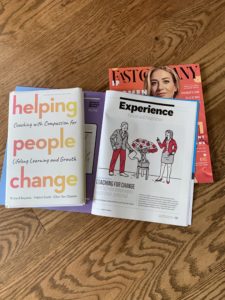 What’s your point of view on business books?
What’s your point of view on business books?
Several individuals I’ve been talking recently have volunteered that they don’t like to read business books.
Yes, I like reading business books provided I admire the author, the topic sounds interesting, or someone I respect has recommended the book.
But until 2005, business books weren’t on my radar. I preferred reading fiction after getting my daily dose of the news.
The turning point was attending a 2005 professional association conference that featured best-selling author and internet pioneer Tim Sanders as the keynoter. Sanders was talking about his second book The Likeability Factor as well as his bestselling first book, Love Is the Killer App: How to Win Business and Influence Friends.
He emphasized the value of reading books over articles because books cover topics in more detail, providing more context, facets and nuance. I agreed that he had a point, even though he was being self-serving.
And so I started my journey of reading double-digit numbers of business books each year. And to my surprise, I now prefer reading non-fiction, including books with a business bent, over fiction.
Yet, I have empathy for those who don’t care for business books. Too many business books read more like padded articles rather than captivating tomes worthy of your time and attention, as I’ve personally discovered.
And also consider how the information world – and our brains – have changed in the past 14 years since Sanders gave this advice. While his plea to go deep on topics through books rather than just skim the surface is still sound, we have many more options.
For example, YouTube started in 2005. Podcasting started to catch on around then too. When we read, we expect to see infographics and other visuals, not just text. We access digital versions of magazines rather than looking for them in the mail. And we consider MOOCs (massive open online courses) and other online learning tools when we need to do delve into a new topic. The smartphone and other devices we keep by our side serve as a gateway to all of this instant information.
As for the professional association that sponsored Sanders? It went out of business earlier this decade. The members were keeping in touch via LinkedIn, email and other ways. Plus, with our jobs and everything else going on, it was becoming harder and less appealing to get away for a multiple-day conference.
And don’t forget. Diving deep is not the only way to learn. There’s great value in diversity. For example, many of us want to investigate new topics to improve our T-shaped skills so we can be better generalists rather than hyper-specialized nerds. That way we can cooperate and collaborate better with others, especially after reading a range of articles, listening to podcasts, and watching videos, including TED Talks. We won’t become instant experts, but we will be more aware.
In my coaching and mentoring of individuals of all ages and at all stages of their career, we talk about taking time to figure out how you like to learn. That’s just as valuable and important as deciding what you want to learn. Don’t feel that you have to do something that you dislike or that doesn’t seem to fit your learning style. You won’t enjoy it and you won’t learn as much.
Also, start small with a new topic. For instance, if you’re interested in coaching for change, which requires compassion rather than compliance, first read the Harvard Business Review article. If you then want to learn more on the topic, read the new book. (I’m glad I did! The book augmented the article in multiple ways.)
And if you love fiction, read literary fiction and enjoy it without any guilt. Literary fiction helps you be empathetic with others, as research shows. And depending on the subject matter, you can increase your general knowledge at the same time.
In today’s VUCA (volatile, uncertain, complex and ambiguous) world, we have to be lifelong learners. If you stand still, you fall behind.
When you expose yourself to new ideas or material, you also increase your understanding, improve your focus, challenge your critical thinking, reduce your stress, and enhance your ability to connect with others.
How are you learning these days?

0 Comments